MAN-POWER.
[To THE EDITOR Or THE " SPECTATOR."]
SIR,—In your article on Man-Power in your issue of January 19th there is a suggestion, and I think it is the second time that it has been made, that the Government should, or might, go back on its promise to men who volunteered before the Conscription Act came into force, and that they should be called up again. In what does this proposal differ from the German disregard for treaties? If this suggestion were accepted and acted upon, would it be possible to say a word against the German lack of faith? Surely the suggestion goes against all principles of honourable dealing. It is no good saying that the men are wanted. The same argument might just as cogently be brought forward in the case of breaking any other pledge, and further, if the Government may break its pledge* why should the individual be made to keep his?
The suggestion really strikes a blow at the root of all law and [The nation which, through its elected representatives, issues a pledge to members of the nation can also recall that pledge by use of the same machinery if the national safety demands it. No statute is permanent. Every statute exists only so long as Parlia- ment sanctions its continuance. Whether it would be advisable or just to recall a pledge so recently given is another matter. Personally, we should be extremely sorry if the discharged fit men were called upon before every other available man of military age had been combed out. That is why we preferred to suggest the inducement of a bonus to the men who would volunteer again. An international pledge has no more essential permanence than a statute. Treaties can be denounced. The just complaint against Germany is that she broke Treaties without due and honest warning being given. We should like to see an international arrangement under which Treaties could not he denounced with- out a year's notice.—En. Spectator.]



































 Previous page
Previous page